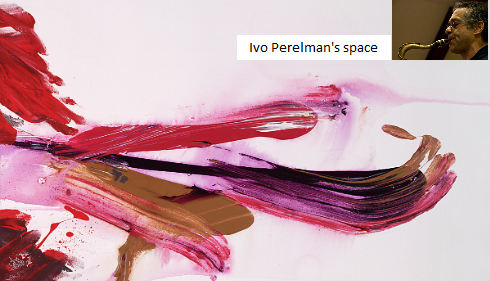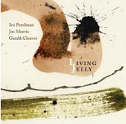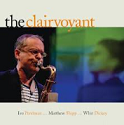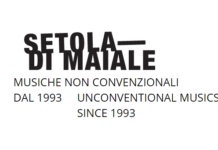
Living Jelly
 Perelman chooses to represent the stories of “Living Jelly” in a trio with Joe Morris on guitar and Gerald Cleaver on drums. This collection of poetic divagations of Lispector is very enigmatic and influence the sound of the trio, which has the problem of transferring into the music the same literary atmosphere. So the structure is recognized in the free jazz themes: we know the characteristics of the three musicians: Cleaver supports rhythmically the dynamic narrative, Morris builds arrangements of contrast and solos that develop as tingling, and Perelman has the task of narrating through the heated images of his sax. The basic tenor of the disc is clearly much less unbalanced on the side of the free paroxysm and has a reflective mood, where each of the three musicians often shares parts of equal importance: “In pursuit of pleasure” mixes a night club experience with a painting by Pollock, where the dynamic response of the trio is unique and played on a good interplay, “Playing with Mercury” propels us on a sort of walking on a small wall, with adjacent precipice: it is pervaded by an expressive anxiety where Perelman seems to be at his ease, pulling out atonal solos that annihilate. The peak of reflection is reached in “The sloth” that relieves tension muffling the tense atmosphere of the album, while “Living Jelly” is a musical portrait perfectly calibrated to Lispector’s novel, in which she speaks of a strange dream, a jelly “living” that even seems to take her to suicide: Perelman and associates are able to dynamically conduct this operation with a wonderful artistic sense of the narrative.
Perelman chooses to represent the stories of “Living Jelly” in a trio with Joe Morris on guitar and Gerald Cleaver on drums. This collection of poetic divagations of Lispector is very enigmatic and influence the sound of the trio, which has the problem of transferring into the music the same literary atmosphere. So the structure is recognized in the free jazz themes: we know the characteristics of the three musicians: Cleaver supports rhythmically the dynamic narrative, Morris builds arrangements of contrast and solos that develop as tingling, and Perelman has the task of narrating through the heated images of his sax. The basic tenor of the disc is clearly much less unbalanced on the side of the free paroxysm and has a reflective mood, where each of the three musicians often shares parts of equal importance: “In pursuit of pleasure” mixes a night club experience with a painting by Pollock, where the dynamic response of the trio is unique and played on a good interplay, “Playing with Mercury” propels us on a sort of walking on a small wall, with adjacent precipice: it is pervaded by an expressive anxiety where Perelman seems to be at his ease, pulling out atonal solos that annihilate. The peak of reflection is reached in “The sloth” that relieves tension muffling the tense atmosphere of the album, while “Living Jelly” is a musical portrait perfectly calibrated to Lispector’s novel, in which she speaks of a strange dream, a jelly “living” that even seems to take her to suicide: Perelman and associates are able to dynamically conduct this operation with a wonderful artistic sense of the narrative.
The gift
 The descriptive function is even more accentuated in “The Gift“, a work that pays homage to Lispector building a detailed body of sound where the focus on music is, I would say, “contemporary”. The trio with Matthew Shipp on piano and Michael Bisio on bass sketch a sophisticated carpet of sounds that evoke strangeness and shout for help, they are expressionistic versions of the words of Brazilian writer (see the wonderful “The gratuitous act”) with Perelman, and Shipp Bisio on the shields. “The Gift” is a story about loneliness, an essential feature of the poetry of Lispector. My friend Clifford Allen in the liner notes mentions a wonderful sentence of the writer….”perhaps love is to give one’s own solitude to others? For it is the very last thing we have to offer….”. The questions on our actions, our altruism, our anguish and dangers of life are well represented here in a formidable structure that lies between the cool jazz of the forties (Perelman in slower dynamics often refers to that type of sound that was of Konitz and Giuffre), free jazz improvisation and modern classical mixture (expression of the musical evolutions of Shipp and Bisio). Definitely one of the best albums of Perelman’s entire career, in “The Gift” is difficult to quote a favourite piece, given the compactness and the interest that the work evokes in all its chronological sequence.
The descriptive function is even more accentuated in “The Gift“, a work that pays homage to Lispector building a detailed body of sound where the focus on music is, I would say, “contemporary”. The trio with Matthew Shipp on piano and Michael Bisio on bass sketch a sophisticated carpet of sounds that evoke strangeness and shout for help, they are expressionistic versions of the words of Brazilian writer (see the wonderful “The gratuitous act”) with Perelman, and Shipp Bisio on the shields. “The Gift” is a story about loneliness, an essential feature of the poetry of Lispector. My friend Clifford Allen in the liner notes mentions a wonderful sentence of the writer….”perhaps love is to give one’s own solitude to others? For it is the very last thing we have to offer….”. The questions on our actions, our altruism, our anguish and dangers of life are well represented here in a formidable structure that lies between the cool jazz of the forties (Perelman in slower dynamics often refers to that type of sound that was of Konitz and Giuffre), free jazz improvisation and modern classical mixture (expression of the musical evolutions of Shipp and Bisio). Definitely one of the best albums of Perelman’s entire career, in “The Gift” is difficult to quote a favourite piece, given the compactness and the interest that the work evokes in all its chronological sequence.
The clairvoyant
 In jazz, there is often no knowledge of what will be the result of improvisation and “The clairvoyant” is a demonstration of this: there is a different perspective, many angularities that engages Perelman and his trio (in this case Matthew Shipp and drummer Whit Dickey) in an instrumental tour de force that announce diversified colors: Dickey’s drumming is more powerful than Cleaver and it adapts to the torrid climate of the proposal, while Shipp continues to rattle off atonal passages of piano that moves the center of gravity of the atmosphere; Perelman and Shipp have now reached an enviable togetherness and the same Shipp admits it: the possibility of playing together but preserving its own method and personality is something that stimulates the two musicians; under a muscular base (Dickey) collide two splendid free jazzmen who act in an artistic operation of functional musical expressionism with different characteristics. “The clairvoyant” is further evidence of Perelman’s extremism, a man who seems to have an inexhaustible breath, while Shipp is a master at creating dynamic tension, anxiety and sense of loss.
In jazz, there is often no knowledge of what will be the result of improvisation and “The clairvoyant” is a demonstration of this: there is a different perspective, many angularities that engages Perelman and his trio (in this case Matthew Shipp and drummer Whit Dickey) in an instrumental tour de force that announce diversified colors: Dickey’s drumming is more powerful than Cleaver and it adapts to the torrid climate of the proposal, while Shipp continues to rattle off atonal passages of piano that moves the center of gravity of the atmosphere; Perelman and Shipp have now reached an enviable togetherness and the same Shipp admits it: the possibility of playing together but preserving its own method and personality is something that stimulates the two musicians; under a muscular base (Dickey) collide two splendid free jazzmen who act in an artistic operation of functional musical expressionism with different characteristics. “The clairvoyant” is further evidence of Perelman’s extremism, a man who seems to have an inexhaustible breath, while Shipp is a master at creating dynamic tension, anxiety and sense of loss.
———————————————————————————————————————————–
Living Jelly
Perelman sceglie di rappresentare le storie di “Living Jelly” in un trio con Joe Morris alla chitarra e Gerald Cleaver alla batteria. Essendo le trame di questa raccolta poetiche divagazioni della Lispector che risultano molto enigmatiche, anche il sound che il trio deve sostenere cerca di ricalcare in musica le stesse atmosfere letterarie. Ecco quindi che la struttura free jazz si riconosce nei temi: le modalità di incontro dei musicisti sono ben note ormai con Cleaver che accende ritmicamente la dinamica narrativa, Morris che costruisce percorsi incrociati fatti di accordi di contrasto e di assoli brulicanti, e Perelman che ha il compito di fare il narratore attraverso le evoluzioni del suo sax. Il tenore di fondo del disco è chiaramente molto meno sbilanciato sul versante del parossismo free ed ha un suo umore riflessivo, dove ciascuno dei tre musicisti spesso non ha parti prevalenti: “In pursuit of pleasure” incrocia un’esperienza da night club con un scrittura free vitale dove la risposta dinamica del trio è univoca e giocata su un ottimo interplay; “Playing with Mercury” ci proietta su una sorta di cammino su un muro con precipizio adiacente, tanta è pervasa da ansia espressiva dove Perelman sembra trovarsi a suo agio sfoderando assoli atonali che annichiliscono; il culmine della riflessione si raggiunge in “The sloth” che allenta la tensione smorzando il clima teso dell’album, mentre “Living Jelly” è un ritratto perfettamente calibrato sulla novella della Lispector, in cui la stessa parla di uno strano sogno in cui una gelatina “vivente” sembra persino spingerla al suicidio, operazione che Perelman e soci riescono a portare dinamicamente avanti con uno splendido senso artistico della narrazione.
The gift
La funzione descrittiva è ancora più accentuata in “The gift”, opera che omaggia la Lispector costruendo un minuzioso corpo sonoro in cui l’attenzione musicale è direi “contemporanea”: il trio con Matthew Shipp al piano e Michael Bisio al contrabbasso imbastisce un tappeto di suoni ricercato, che lanciano stranezze e gridano aiuto, sono versioni espressioniste delle parole della scrittrice brasiliana (vedi la splendida “The gratuitous act”) con Perelman, Shipp e Bisio sugli scudi. “The gift” è un racconto sulla solitudine, una caratteristica essenziale della poesia della Lispector. Il mio amico Clifford Allen nelle note di copertina cita una splendida frase della scrittrice “……forse amare è accollarsi una propria solitudine per gli altri, perchè è l’ultima cosa che abbiamo da offrire….”. Gli interrogativi sulle nostre azioni, sul nostro altruismo, sulla nostra angoscia e i pericoli della vita sono qui perfettamente rappresentati in una struttura formidabile che sta tra il cool jazz dei quaranta (Perelman nelle dinamiche più lente si rifà spesso a quella tipologia di suono che fu di Konitz e Giuffre), l’improvvisazione free jazz e gli impasti di classicità moderna (espressione delle evoluzioni di Shipp e Bisio). Sicuramente uno dei migliori albums di tutta la carriera di Perelman, in cui è arduo citare dei brani migliori di altri data la compatezza e l’interesse che “The gift” suscita in tutto il suo iter temporale.
The clairvoyant
Nel jazz spesso non c’è cognizione di quello che sarà il risultato dell’improvvisazione e “The clairvoyant” ne è una dimostrazione: in esso c’è una angolatura diversa, una spigolosità che impegna Perelman e il suo trio (in questo caso Matthew Shipp e il batterista Whit Dickey) in un tour de force strumentale che esprime tinte variegate: Dickey ha una potenza d’urto superiore a Cleaver e si inquadra nell’incadescenza della proposta, mentre Shipp continua a snocciolare atonali passaggi di piano che rendono oblique le atmosfere; Perelman ha ormai raggiunto con Shipp un affiatamento invidiabile e lo stesso Shipp lo ammette; la possibilità di suonare con il proprio metodo preservando nell’insieme la propria personalità è cosa che stimola entrambi: sotto una base muscolare (Dickey) si scontrano due splendidi free jazzman in piena funzione “espressionista”. In “The clairvoyant” si ritrova il Perelman più estremista, quello che sembra aver un fiato inesauribile mentre Shipp è un maestro nel creare dinamicamente tensione, ansia e senso di smarrimento.
 Perelman chooses to represent the stories of “Living Jelly” in a trio with Joe Morris on guitar and Gerald Cleaver on drums. This collection of poetic divagations of Lispector is very enigmatic and influence the sound of the trio, which has the problem of transferring into the music the same literary atmosphere. So the structure is recognized in the free jazz themes: we know the characteristics of the three musicians: Cleaver supports rhythmically the dynamic narrative, Morris builds arrangements of contrast and solos that develop as tingling, and Perelman has the task of narrating through the heated images of his sax. The basic tenor of the disc is clearly much less unbalanced on the side of the free paroxysm and has a reflective mood, where each of the three musicians often shares parts of equal importance: “In pursuit of pleasure” mixes a night club experience with a painting by Pollock, where the dynamic response of the trio is unique and played on a good interplay, “Playing with Mercury” propels us on a sort of walking on a small wall, with adjacent precipice: it is pervaded by an expressive anxiety where Perelman seems to be at his ease, pulling out atonal solos that annihilate. The peak of reflection is reached in “The sloth” that relieves tension muffling the tense atmosphere of the album, while “Living Jelly” is a musical portrait perfectly calibrated to Lispector’s novel, in which she speaks of a strange dream, a jelly “living” that even seems to take her to suicide: Perelman and associates are able to dynamically conduct this operation with a wonderful artistic sense of the narrative.
Perelman chooses to represent the stories of “Living Jelly” in a trio with Joe Morris on guitar and Gerald Cleaver on drums. This collection of poetic divagations of Lispector is very enigmatic and influence the sound of the trio, which has the problem of transferring into the music the same literary atmosphere. So the structure is recognized in the free jazz themes: we know the characteristics of the three musicians: Cleaver supports rhythmically the dynamic narrative, Morris builds arrangements of contrast and solos that develop as tingling, and Perelman has the task of narrating through the heated images of his sax. The basic tenor of the disc is clearly much less unbalanced on the side of the free paroxysm and has a reflective mood, where each of the three musicians often shares parts of equal importance: “In pursuit of pleasure” mixes a night club experience with a painting by Pollock, where the dynamic response of the trio is unique and played on a good interplay, “Playing with Mercury” propels us on a sort of walking on a small wall, with adjacent precipice: it is pervaded by an expressive anxiety where Perelman seems to be at his ease, pulling out atonal solos that annihilate. The peak of reflection is reached in “The sloth” that relieves tension muffling the tense atmosphere of the album, while “Living Jelly” is a musical portrait perfectly calibrated to Lispector’s novel, in which she speaks of a strange dream, a jelly “living” that even seems to take her to suicide: Perelman and associates are able to dynamically conduct this operation with a wonderful artistic sense of the narrative. The descriptive function is even more accentuated in “The Gift“, a work that pays homage to Lispector building a detailed body of sound where the focus on music is, I would say, “contemporary”. The trio with Matthew Shipp on piano and Michael Bisio on bass sketch a sophisticated carpet of sounds that evoke strangeness and shout for help, they are expressionistic versions of the words of Brazilian writer (see the wonderful “The gratuitous act”) with Perelman, and Shipp Bisio on the shields. “The Gift” is a story about loneliness, an essential feature of the poetry of Lispector. My friend Clifford Allen in the liner notes mentions a wonderful sentence of the writer….”perhaps love is to give one’s own solitude to others? For it is the very last thing we have to offer….”. The questions on our actions, our altruism, our anguish and dangers of life are well represented here in a formidable structure that lies between the cool jazz of the forties (Perelman in slower dynamics often refers to that type of sound that was of Konitz and Giuffre), free jazz improvisation and modern classical mixture (expression of the musical evolutions of Shipp and Bisio). Definitely one of the best albums of Perelman’s entire career, in “The Gift” is difficult to quote a favourite piece, given the compactness and the interest that the work evokes in all its chronological sequence.
The descriptive function is even more accentuated in “The Gift“, a work that pays homage to Lispector building a detailed body of sound where the focus on music is, I would say, “contemporary”. The trio with Matthew Shipp on piano and Michael Bisio on bass sketch a sophisticated carpet of sounds that evoke strangeness and shout for help, they are expressionistic versions of the words of Brazilian writer (see the wonderful “The gratuitous act”) with Perelman, and Shipp Bisio on the shields. “The Gift” is a story about loneliness, an essential feature of the poetry of Lispector. My friend Clifford Allen in the liner notes mentions a wonderful sentence of the writer….”perhaps love is to give one’s own solitude to others? For it is the very last thing we have to offer….”. The questions on our actions, our altruism, our anguish and dangers of life are well represented here in a formidable structure that lies between the cool jazz of the forties (Perelman in slower dynamics often refers to that type of sound that was of Konitz and Giuffre), free jazz improvisation and modern classical mixture (expression of the musical evolutions of Shipp and Bisio). Definitely one of the best albums of Perelman’s entire career, in “The Gift” is difficult to quote a favourite piece, given the compactness and the interest that the work evokes in all its chronological sequence. In jazz, there is often no knowledge of what will be the result of improvisation and “The clairvoyant” is a demonstration of this: there is a different perspective, many angularities that engages Perelman and his trio (in this case Matthew Shipp and drummer Whit Dickey) in an instrumental tour de force that announce diversified colors: Dickey’s drumming is more powerful than Cleaver and it adapts to the torrid climate of the proposal, while Shipp continues to rattle off atonal passages of piano that moves the center of gravity of the atmosphere; Perelman and Shipp have now reached an enviable togetherness and the same Shipp admits it: the possibility of playing together but preserving its own method and personality is something that stimulates the two musicians; under a muscular base (Dickey) collide two splendid free jazzmen who act in an artistic operation of functional musical expressionism with different characteristics. “The clairvoyant” is further evidence of Perelman’s extremism, a man who seems to have an inexhaustible breath, while Shipp is a master at creating dynamic tension, anxiety and sense of loss.
In jazz, there is often no knowledge of what will be the result of improvisation and “The clairvoyant” is a demonstration of this: there is a different perspective, many angularities that engages Perelman and his trio (in this case Matthew Shipp and drummer Whit Dickey) in an instrumental tour de force that announce diversified colors: Dickey’s drumming is more powerful than Cleaver and it adapts to the torrid climate of the proposal, while Shipp continues to rattle off atonal passages of piano that moves the center of gravity of the atmosphere; Perelman and Shipp have now reached an enviable togetherness and the same Shipp admits it: the possibility of playing together but preserving its own method and personality is something that stimulates the two musicians; under a muscular base (Dickey) collide two splendid free jazzmen who act in an artistic operation of functional musical expressionism with different characteristics. “The clairvoyant” is further evidence of Perelman’s extremism, a man who seems to have an inexhaustible breath, while Shipp is a master at creating dynamic tension, anxiety and sense of loss.






